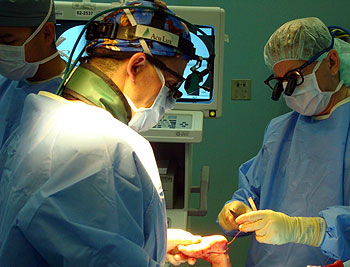In late July, Jeffrey Lowell, M.D., was in El Salvador operating on a Salvadoran soldier who had been injured by a grenade explosion while serving in Operation Iraqi Freedom. Lowell and a colleague from the U.S. Navy spent about an hour removing tiny pieces of shrapnel from the soldier’s shoulder and neck.
Lowell, known at the School of Medicine as professor of surgery and of pediatrics, was deployed on a mission serving in his role as a commander in the U.S. Public Health Service Reserve. Commander Lowell was deployed on the Military Sealift Command hospital ship USNS Comfort July 13-Aug. 6 to serve as a general surgeon while the ship was in Panama, Nicaragua and El Salvador.

The nearly 900-foot-long ship, originally built as an oil tanker, is on a four-month mission in South America, Central America and the Caribbean providing training, free medical treatment and humanitarian assistance.
Lowell and the other physicians on board saw patients in land-based clinics, most without electricity or air conditioning in stifling heat, to provide adult and pediatric medicine, optometry, dermatology, preventative medicine and dental care. Hundreds of patients would be lined up at the clinic before the physicians arrived, Lowell said.
Because the ship was too large to dock at many of the ports, patients who needed surgery were taken to the ship via boat or Blackhawk helicopter. The surgeons would each handle about six or seven cases a day, including hernia repair, clubfoot repair and other orthopedic procedures, and gynecological and urological procedures, Lowell said.
“The experience was personally and professionally gratifying,” Lowell said. “These people have no money and little access to health care. The frustrating thing was not being able to help more of them.”
The ship has a crew of 800, including 500 medical personnel, and personnel from the Military Sealift Command, U.S. Navy, U.S. Public Health Service, U.S. Air Force, U.S. Coast Guard, U.S. Army and Canadian Armed Forces.
In addition, Operation Smile, a non-governmental organization that provides cleft palate repair, and Project Hope, a non-governmental organization that provides medical and dental services, are also on board.
The medical personnel are providing services to citizens in Colombia, Ecuador, El Salvador, Guatemala, Guyana, Haiti, Nicaragua, Panama, Peru, Suriname, and Trinidad and Tobago.
The ship’s Seabees are repairing medical equipment, restoring existing medical facilities and providing needed construction services on hospitals, schools and other facilities in those countries.